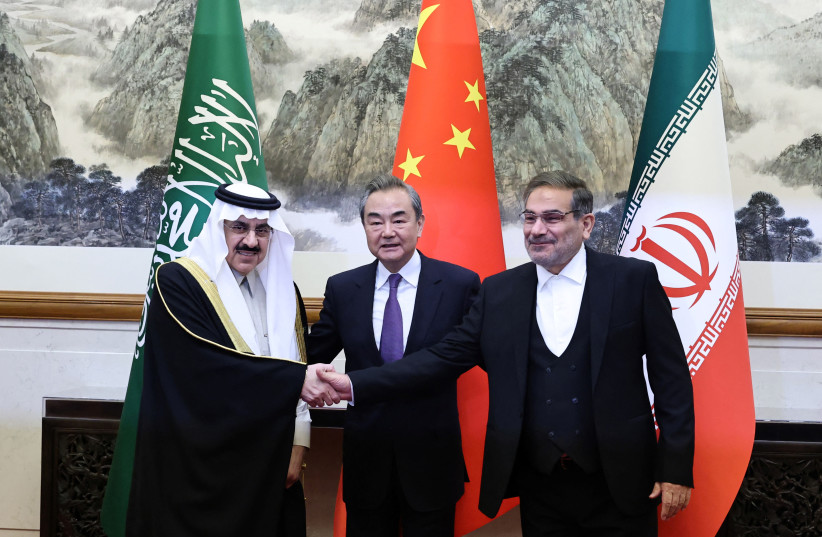There is no other way to put it: The China-brokered deal between Saudi Arabia and Iran is a body blow to Israeli Prime Minister Benjamin Netanyahu’s efforts to isolate Iran.
Netanyahu’s foreign policy goals have also been stymied by Israel’s multiple domestic crises, from unexpectedly strong left-wing opposition to his party’s Justice reform plans to a spate of shockingly violent terrorist attacks across Israel.
Netanyahu has long led international efforts to stop Iran’s efforts to develop and deploy nuclear weapons. His motive is not mysterious. Iran, in its state-run broadcasts, has repeatedly called for the end of Israel and backed its words with actions, including funding proxy militias, including Hezbollah and Hamas, to kill Israelis. Iran has also armed tribes in Yemen to attack Saudi Arabia and Abu Dhabi.
Uniting Iran’s enemies against it has long been Netanyahu’s strategy.
He has striven to normalize relations with Saudi Arabia, hoping to make it the centerpiece of a security-based alliance of Sunni Arab countries and Israel. Now, that looks less likely.
Nor will the freer movement of diplomats between Saudi Arabia and Iran automatically ease the tensions that have divided Riyadh and Tehran for decades. Each nation sees the other as a rival for regional dominance; sometimes that contest of wills mutates into armed conflict, as in Iraq, Syria and Yemen. Iran remains an authoritarian threat to its own people and its neighbors. It is a regime that, just a few months ago, killed hundreds of Iranian women who sought to uncover their faces in public places.

The China-brokered Iran deal will only survive if Tehran abandons its hegemonic strategy, which is the main cause of the underlying tensions. Iran’s regime’s internal legitimacy depends on a notion of Shi’ite regional supremacy, something that Sunni Arabs can never accept. Thus, the deal will not last.
To find a path forward, we must return to the spirit of the Abraham Accords.
From shared prosperity to peace was the spirit of the agreements; unfortunately, we have moved away from it every day.
Returning to the accords and animating the idea of shared prosperity would unify Arab countries and break down the resistance of those who were skeptical of the agreements with Israel while fomenting favorable Arab public opinion. It’s the key to all peace.
THE ACCORDS included a massive $50 billion (NIS 181.7 b.) economic growth plan for the Near East. These funds will build schools, roads, hospitals, port facilities and water pipelines. This infrastructure will create jobs directly, indirectly fueling the small-business boom. Much of this requires Israeli support, to trim taxes, cut red tape and fund projects.
Netanyahu should see his opportunity to propose a courageous peace plan with the Palestinians, which was already sketched out in the accords. Focusing on economic growth will help all Israelis and their Palestinian neighbors. New jobs and renewed hope would invigorate younger Palestinians, who want to start or support new families and it is the outlook of younger generations, who are prepared to put aside the prejudices of the past, that offers the best path to peace.
United States policymakers should not ignore the role China played in brokering the deal. The Middle Kingdom has interests in the Middle East and intends to protect them. Its extensive trade ties have led to political engagement and docking rights for its growing navy. Intelligence and security cooperation may not be far behind.
We are witnessing the emergence of China’s political role in the region. This is a warning: Abandon ties with sometimes frustrating but long-standing Arab allies and you are simply presenting China with a void to fill.
Make no mistake: A China-dominated Middle East would threaten US trade and national security. A China-dominated Middle East might also send waves of destabilizing refugees into Europe and guarantee a market for Russian arms, oil, grains and consumer goods that will strengthen Putin’s hand in Ukraine and globally.
America’s security interests aren’t about oil for itself. China is a big customer of Saudi and Iranian oil while America receives no oil from Iran and relatively little from Saudi Arabia. However, the nature of global oil markets means that the US economy is still swayed by price shifts. Equally important, the energy security of its allies, from NATO to Japan, depends on the free flow of oil from non-sanctioned countries. Therefore, the US still has substantial interests in the Middle East.
It is time for the Biden administration to ask hard questions about America’s Middle East policies, starting with: Should we return to the Abraham Accords as the foundation for a peace process in the Middle East because it is in America’s interest to deepen the scope of cooperation among the countries of the region? Or should we let China and Russia write the future of the region?
The writer sits on the board of the Atlantic Council and the International Crisis Group in Washington.
